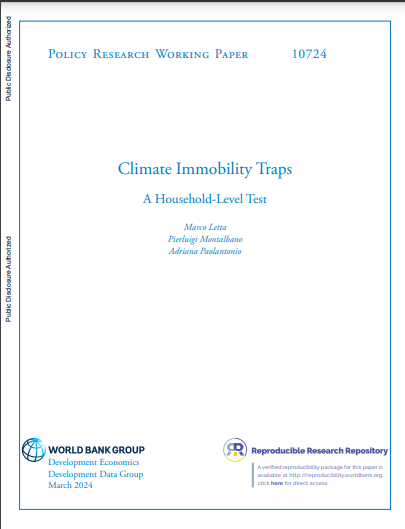Reproducibility package for Climate Immobility Traps: A Household-Level Test
Overview
The complex relationship between climate shocks, migration, and adaptation hampers a rigorous understanding of the multiple channels that drive the heterogeneous mobility responses of farm households exposed to climate stress. To unpack this heterogeneity, we couple a causal machine learning approach, tailored to a conceptual framework bridging the New Economics of Labor Migration and the poverty traps literature, with longitudinal multi-topic household data from Nigeria. The estimated conditional average treatment effects suggest that some key variables—pre-shock asset levels, in situ adaptive capacity, and cumulative shock exposure—drive not just the magnitude but even the sign of the impact of agriculture-relevant weather anomalies on the (im)mobility outcomes of farming households. While local adaptation acts as a substitute for migration, the amplifying role played by liquidity constraints and repeated shock exposure is consistent with the existence of climate-induced immobility traps.
Reproducibility Package
| Repository name | URI |
|---|---|
| Reproducible Research Repository (World Bank) | https://reproducibility.worldbank.org |
Reproducibility
Paper exhibits were attempted to be reproduced in three computers with the following specifications:
– OS: Windows 11 Enterprise
– Processor: Intel(R) Core(TM) i5-1145G7 CPU @ 2.60GHz
– Memory available: 15.7 GB
– Software version: Stata version 17, R version 4.3.0
~7 min runtime
To run the package, new users only need to change the file paths in the scripts.
Data
The data employed for this analysis come from two data sources. Uniform Panel Data from Nigeria's General Household Survey (GHS) and Standardized Evapotranspiration Index (SPEI) data developed by Beguería et al. (2014). The reproducibility package runs from intermediate data stored in the DataSets folder. While the authors have provided specifications in their README file for constructing this dataset from raw sources, it does not include the code necessary to generate it. For questions regarding data for this package, please contact Marco Letta at marco.letta@uniroma1.it
Description
| Author | Affiliation | |
|---|---|---|
| Marco Letta | Sapienza University of Rome | marco.letta@uniroma1.it |
| Pierluigi Montalbano | Sapienza University of Rome | pierluigi.montalbano@uniroma1.it |
| Adriana Paolantonio | World Bank | apaolantonio@worldbank.org |
2023-11
Scope and coverage
| Location | Code |
|---|---|
| Nigeria | NGA |
Disclaimer
The materials in the reproducibility packages are distributed as they were prepared by the staff of the International Bank for Reconstruction and Development/The World Bank. The findings, interpretations, and conclusions expressed in this event do not necessarily reflect the views of the World Bank, the Executive Directors of the World Bank, or the governments they represent. The World Bank does not guarantee the accuracy of the materials included in the reproducibility package.
Access and rights
| Name | URI |
|---|---|
| Modified BSD3 | https://opensource.org/license/bsd-3-clause/ |
Contacts
| Name | Affiliation | |
|---|---|---|
| Marco Letta | Sapienza University of Rome | marco.letta@uniroma1.it |
| Reproducibility WBG | World Bank | reproducibility@worldbank.org |
Information on metadata
| Name | Abbreviation | Affiliation | Role |
|---|---|---|---|
| Reyes Retana | MRR | World Bank | Junior Data Scientist |
2023-11-27
1
